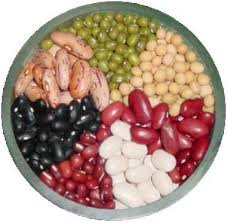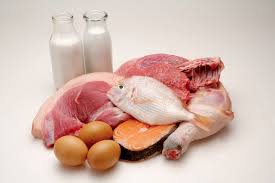Know Your Protein

Proteins:
Proteins are one of the most important nutrients required by the body and should be supplied through diet. The adequacy of protein in the diet is an important measure of adequacy & quality of a diet.
Why do we need Proteins?
Proteins are vital to the living process & carryout a wide range of functions essential for the sustenance of life.
- Helps in growth & development
- Important constituent of cells and tissues of the body
- Important component of muscles, body fluids, enzymes and hormones
- Repairs wear and tear of tissue as a body building material
- As antibodies, helps the body to defend against infections.
What is Biological value?
The biological value of protein is defined as the percentage of absorbed protein retained by the body. If the absorbed protein from any food is retained and utilized well, then that foods gives high biological value protein. If the retention of absorbed proteins is less, then that food gives proteins of low biological value.
How to get enough proteins in your diet?
Consumption of 6 servings of protein rich foods in a day’s menu will make the diet rich in proteins. When requirement of proteins is increased than normalcy, high biological value proteins will be more helpful.
Proteins of high biological value:
- Egg
- Chicken Meat
- Sea foods like fish, prawns, crab
- Milk & milk products – Milk, curd, milk powder, milk sweets, paneer, cheese, ice cream
Proteins of low biological value:
- Cereals : Rice, Wheat, Ragi, Maida, Whole wheat flour, Maize, Rava, Vermicilli, Puffed rice, Rice flakes.
- Pulses & Legumes : Toor dhal, Bengal gram, Black gram, Cow pea, Green gram, Horse gram, Kesari dhal, Lentils, Peas, Rajmah, Soyabean
- A combination of cereal & pulse in the ratio 4:1 has been found to give good quality complete proteins.
- Sprouted pulses have more proteins than unsprouted pulses & is easily digestible
- Nuts & Oil Seeds : Cashew, Almonds, Pista, Gingelli, Groundnuts, Walnuts
- Mushroom.
- Others: Acalypha indica (Kuppigida), Amaranthus paniculatus (Rajagira leaves), Drumstick leaves, Sesbania grandiflora (Agase), Solanum nigrum (Ganika), Parsley, Jack fruit seed, wood apple, Solanum torvum (Sondekai) also have proteins in them.
Proteins also provide energy, 1g of protein gives 4.2 K.Cal. If the diet does not contain adequate carbohydrates & fats to provide energy, dietary protein may be broken down to provide energy which is a wasteful way of using proteins. Hence, diet should contain adequate carbohydrate & fats to provide energy so that the proteins in the diet are most economically used to fulfill other functions essential to life.
A HIGH PROTEIN DIET WILL HELP IN WEIGHT REDUCTION!
Some Recipes Rich in Protein:
- Idly, dosa.
- Kitchadi / Pongal
- Paneer mutter masala.
- Peas pulav
- Soya Chunks (Meal Maker) curry.
- Pepper Mushroom
- Malt
- Soya bean curry, soy milk
- Nuts chikki*
- Pesarattu * (Sweet poli with moong dhal)
- Modhagam*
- Rice flakes Kheer*
- Basandhi*, Rasagulla*, Rasmalai*.
- Oats with milk
- Egg Fried Rice, Egg curry, Omlette
- Roasted organ meats (Liver, Kidney)
- Tandoor / Grilled Chicken and Fish
*Not recommended for diabetics
.“Thy Food is Thy Medicine”










